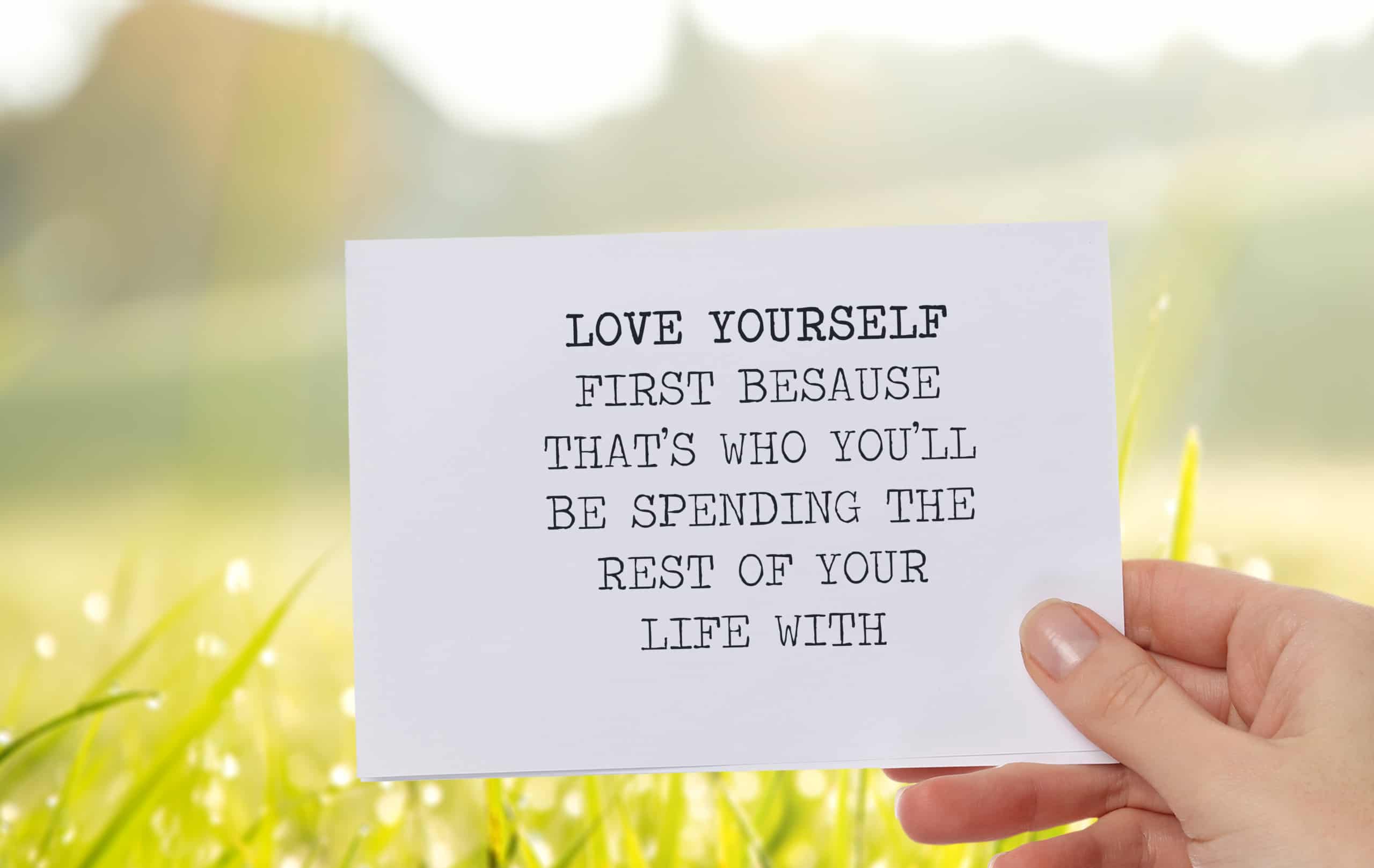Mental health issues can arise when you don’t set boundaries. A lack of boundary-setting can leave you feeling depressed, anxious, or traumatized when others cross the limits you didn’t realize you needed to communicate.
Unfortunately, it can be quite tricky to determine and defend your boundaries, especially if you’ve never done it before. Without them, though, you put yourself at risk for being taken advantage of, receiving poor treatment, and being surrounded by people who have no idea that they’re hurting you.
Though it seems overwhelming,s doesn’t have to be nearly impossible. There are many tips that you can make use of to stand up for the lines you don’t want others to cross.
Here are nine ways to set boundaries to protect your mental health.

Motivation Inspirational quote love yourself first because that’s who you’ll be spending the rest of your life with. Success, Self acceptance, Future, Choice, Happiness concept
1. Define Boundaries By Your Personal Needs
Before you can even begin defining boundaries properly, you need to understand the needs and rights than you have. Think of your fundamental human rights and the kinds of consideration you naturally afford to even strangers around you. This list can be very simple or very complex. It’s up to you. Here are some examples:
- The right to privacy
- The right to respectful treatment
- A right to failing and learning from failure
- The right to defy unreasonable expectations
- The right to guilt-free “no”s
- A right to equally important needs as everyone else
These fundamental rights are the center of your boundaries. These are non-negotiable rights that must be met, and you owe it to yourself to uphold them all the time. With these as your baseline, you can begin considering other boundaries. Think about:
· What Are Your Values?
What morals and ideals do you base your opinions and goals on? How can you set boundaries that are well-met and compliment those values? How will your limitations reflect or challenge those values?
· When Do You Need To Say No?
Take note of when you feel uncomfortable and when you wish you hadn’t said “yes” to things. Assertiveness is necessary for many parts of life, and to be assertive in your “no”s, you must first understand when you need that “no.”
· What Do Your Instincts Say?
Going with your gut is an excellent way to build boundaries, too, as long as they’re consistent when you communicate them. If you feel like something violates a yet unspoken limit or even just makes you uncomfortable, it’s time to set a boundary up.
2. Know Where Your Limits Are
Once you know your basic needs, it’s time to figure out where your limits are. This isn’t just about what point you can get to before you snap. It’s about physical, spiritual, emotional, and intellectual limits, which can differ depending on the person involved. You would have different boundaries between family members, intimate partners, colleagues, and minor acquaintances, for example.
If it’s challenging to make sense of, try drawing out a chart for yourself and filling in where your boundaries fall for different groups or individuals in your life. Visualizing your limits can help you to form accurate and practical barriers.
3. Be Assertive, In The Right Way
When you enforce boundaries, you need to be assertive to be taken seriously. But keep in mind that assertiveness is not being cruel, nor is it overly forgiving. Assertiveness is firm without losing human empathy, and it’s direct without being aggressive.
Your best bet is to use “I” statements, such as “I feel…”, “I would like…”, or “I dislike…” as opposed to accusatory statements, such as “You never…”, “You make me…”, or “Go away!”. Your aim is effective communication, not a fight.
Some examples of positive assertiveness in boundary-setting are as follows:
- I felt uncomfortable when you made that joke and would like for you not to joke about that topic around me again.
- I get overwhelmed when every detail of my day is planned this way. I need some wiggle room for improvisation, so I don’t get too stressed out.
- I dislike it when you touch me there without asking. Please ask first in the future.
- I need some time to myself right now. Let’s come back to this in half an hour.
Some examples of ineffective communication of boundaries are as follows:
- Keep your hands off my cupboard!
- You’re ruining my whole day, and I don’t want to be around you anymore.
- How dare you take that without asking!
- My other friends never do that to me!
- You’re so annoying and uncaring.
4. Care For Yourself
Self-care is crucial for positive thinking and overall health and happiness. It’s challenging to set and enforce boundaries when you’re not in a good state of mind, as what you can and can’t handle will fluctuate wildly in such times. When you’re well-cared-for, your desire to stand up for yourself will increase as you recognize how crucial your feelings are.
Besides, don’t be afraid to seek support if you need it. Getting help is a part of taking care of yourself. You can talk to friends or family, go for counseling or therapy, or attend support or religious groups – whatever you need to do to get the support you need!
5. Keep Some Spaces Safe
Many people have made a joke out of the term “safe space” on the Internet, but the reason the word exists in the first place is that everyone needs safe spaces. This safety is especially important in the digital era.
Some ideas for keeping spaces safe are:
- Planning for some “alone time” that is non-negotiable.
- Setting a cut-off time for when you answer non-leisure messages or emails.
- Creating a default “out of office” response template
- Putting private items in locked or secured containers or locations
- Making use of codes, passwords, and security features
- Turning your phone off sometimes
- Muting online conversations you want to take a break from
- Triple-checking day-off schedules with the relevant departments
- Enforcing a strict bedtime or rest time
Safe spaces can also consist of things like time. This is especially true when it comes to things like an introvert’s need for quiet alone time or when it comes to work-life balance. The expectation of responding to work-related stuff outside of work hours can impact previously happy and positive relationships.
6. Start Small and Practice, Practice, Practice
If you didn’t set boundaries before this, that means learning of these boundaries and how to enforce them is brand new to you. This concept is the same as learning any kind of new skill. As such, you can always start small. Here are some tips:
- Start with a lower boundary that is extremely easy to find reasonable and doesn’t feel threatening.
- Don’t try to enforce a boundary that makes you feel overwhelmed to defend just yet.
- Work your way up gradually to enforcing more significant and more critical boundaries.
- Try not to concern yourself too much with the reactions of others.
- Practice the use of terms like “no,” “no thank you,” and other similar phrases without providing an apology or reasoning for it.
- Try enforcing boundaries with people you trust first.
7. Grant Yourself The Permission
For a lot of people, guilty feelings can often take root when they first try enforcing boundaries. You can feel fear over the response of others, feel guilty for being assertive, or doubt the validity of your limitations.
Put on your positive thinking. You deserve the right to comfort and stress-free relations, and you deserve to be respected. Permit yourself to take up space, require basic respect, and defend yourself because you’re worth all of that.
8. Know The Consequences
Every action has consequences. What are the implications of yours and others’ actions towards you? Here are some ways to know the consequences beforehand:
· Decide What Happens To Disrespectful People
Eventually, there will be someone who simply doesn’t respect your boundaries. In that situation, what are you going to do? What will be the consequences for that person? Decide this in advance, so when it happens, you’re prepared.
· If Your Methods Don’t Work, Change Them
You aren’t capable of changing others, so your best bet is to work on improving your responses to others. Be prepared to change the way you usually handle situations based on common problems.
· Speak Through Actions
Make sure your boundaries are enforced by more than just words. Clearly show where your limitations are and what happens when they are broken. Actions always speak louder than words.
· Know When To Walk Away
Some people are simply lost causes. If someone repeatedly disrespects your boundaries despite your communication, let them go and move on. You don’t need people like that in your life.
9. Understand Why You’re Setting Them So You Set Healthy Ones
If you’re having trouble setting or enforcing boundaries, remember why you’re doing so. Here are some essential things to keep in mind:
· Boundaries Improve Emotional Energy
When you don’t set boundaries, the pain, stress, and resentment build up within you, and you may not know how to stop or change it. Your emotional energy gets drained and sapped, leaving you with less positive thinking every day.
· Boundaries Boost Self-Esteem
When you set boundaries, you are putting yourself first where it matters. You become your priority, which has significant positive effects on your self-esteem.
· Boundaries Improve Relationships
Better self-esteem means better relationships, and a better understanding of your boundaries allows you to enjoy your relationships without stress or fear.
· Boundaries Help You Grow
When you set boundaries, you’re open and vulnerable to others, and this helps you to grow as a person and to foster better, more trusting relationships with others.
· Boundaries Are Flexible
You can set boundaries easily because they don’t have to be set in stone. As you grow and evolve, you can make changes to your boundaries and update them with those who matter.
 Final Thoughts On Some Ways To Set Boundaries To Protect Your Mental Health
Final Thoughts On Some Ways To Set Boundaries To Protect Your Mental Health
Without boundaries, mental health suffers significantly. The fact that boundaries can be crossed without anyone realizing it makes it all the scarier to stand up for them, but doing so is worth it.
Keep in mind that the people who genuinely love you, care for you, and deserve to have you in their lives are those who will respect your boundaries. Start thinking hard about what your limits are today, and you’ll be thanking yourself later!



















